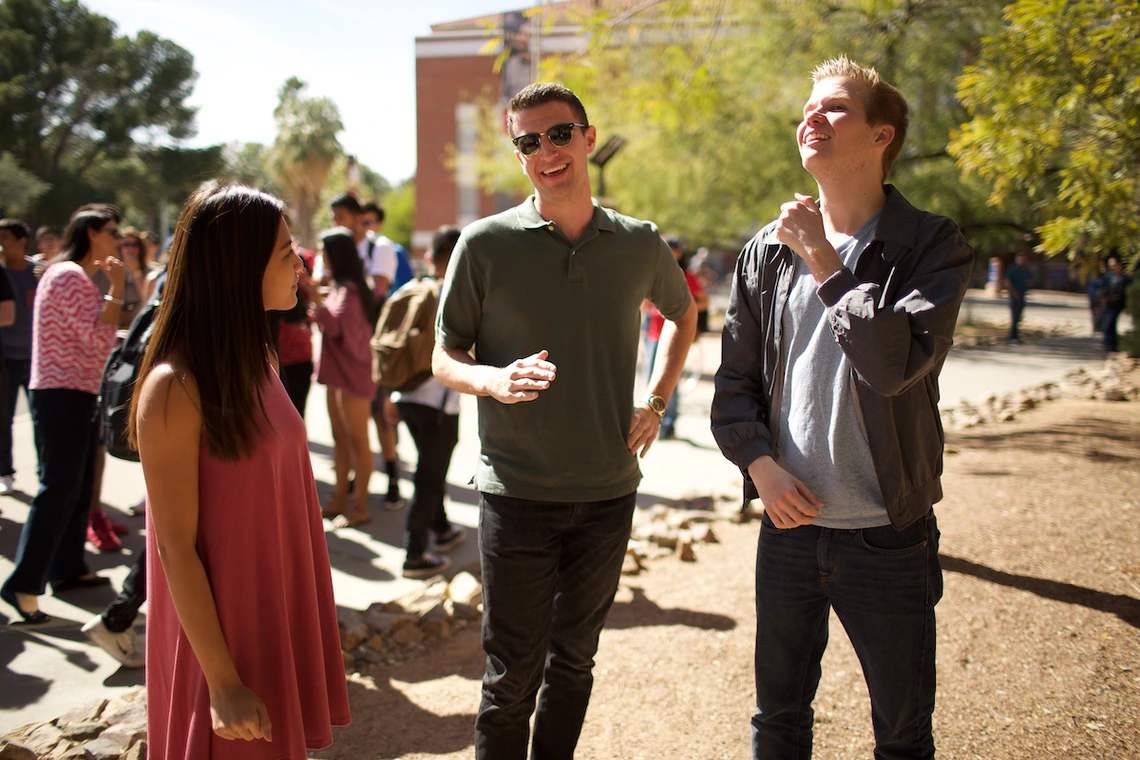Q&A: Unpacking the Psychology of 'Cool' With Eller's Caleb Warren

Most people would agree that University of Arizona students like these three, chatting outside of Old Main, are cool. While defining what makes someone "cool" can be tricky, a University of Arizona researcher has found that the traits people associate with coolness are surprisingly consistent around the world.
It can be tough to define exactly what makes someone cool, but a University of Arizona researcher is taking on the challenge. Caleb Warren, professor in the Department of Marketing in the Eller College of Management has been asking people around the world – from teenagers to those in their 80s – to define what makes people "cool," what makes people "good," and whether the two ever overlap.

Caleb Warren
Warren and his co-authors, Todd Pezzuti with Universidad Adolfo Ibáñez in Chile and Jinjie Chen with the University of Georgia, collected responses from people in 12 countries and found that, across cultures, people tend to associate coolness with six traits: extroversion, hedonism, power, adventurousness, openness and autonomy. Good people, on the other hand, were described as conforming, traditional, secure, warm, agreeable, universalistic, conscientious and calm. Only one attribute – being capable – was seen equally as cool and good. The research appears in the Journal of Experimental Psychology: General.
Warren, who holds the Robert A. Eckert Endowed Chair in Marketing, spoke with Lo Que Pasa about why coolness matters, what employees might take away from the research and what he'd like to study next.
Read more about the research in a story posted on the university's news website.
Why is it important to study coolness?
I started studying this as a marketing student, because I was trying to figure out, why do people buy things? And a lot of the answer was because they think it's cool. But I think it has bigger implications beyond marketing. How does the pursuit of cool affect our politics and the way we interact with each other, and the way we form laws and change norms in a culture or in society?
To understand all these things, we need to understand how people and things become cool, and why people pursue coolness, in themselves, their activities and their purchases.
Were you surprised by any of the results?
What surprised me was how little variation there was across cultures. When we started this project, we had two questions. The first was: What attributes are distinctly cool? Previous research had shown that cool people have a wide variety of desirable attributes, like being friendly, attractive and capable. Question two was how does the meaning of coolness, or how we define people who are cool, change across cultures?
To answer that question, we ran the same study in 12 different countries. Originally, we were going to look for differences between the cultures, but we didn't find any. We saw the same basic pattern in all the countries we looked at.
What can companies and organizations take from these results?
I think the business implications are clear. So much of marketing depends on word of mouth, endorsement and getting the right people to speak on behalf of your product.
I think it's much harder to directly make your product, brand or company cool than it is to associate your product, company or brand with a cool person. I think this research can help companies identify cool people; or if they are themselves trying to be cool, they can try to represent or embody these different attributes.
The beneficial thing about being cool is that it can take a company or product that is unknown and help it get noticed and valued by a larger group of people.
Some of my earlier work showed that, for companies and brands that are already market leaders, being cool might not be helpful, because it has a sort of divisive edge to it. You're probably better off just being seen as good.
What lessons can people who work in marketing, branding or outreach across campus take from your research?
I think it depends on the target audience. To the extent that the target audience cares about being cool, it would help to associate the brand or program with people who seem extroverted, autonomous, open and adventurous. For instance, marketers in charge of recruiting undergraduate students for U of A might post stories about current students or alumni with these traits on the website or recruit tour guides who have these traits.
Did anything in this study shift your own thinking about what makes someone cool, or how people around the world define good versus cool?
I suspected that cool people would have traits related to independence and novelty-seeking, like autonomy, power, openness and adventurousness based on my previous work, but I hadn't thought about how cool people are also extroverted. This suggests that being cool isn't merely about doing your own thing. You also need to share whatever you're doing with others.
What's next for this line of research?
I think what these results suggest, especially in line with my other work, is that cool continues to serve as an alternative form of social status. The reason we have status is to give rewards to the people who we think contribute more to our group or society. As a result, the way that people have earned status has very dramatically changed over time and place and culture. Are there certain types of cultures that value coolness more? How about different industries? Does coolness matter more in fashion, music or technology? That's where I'd like to go.

